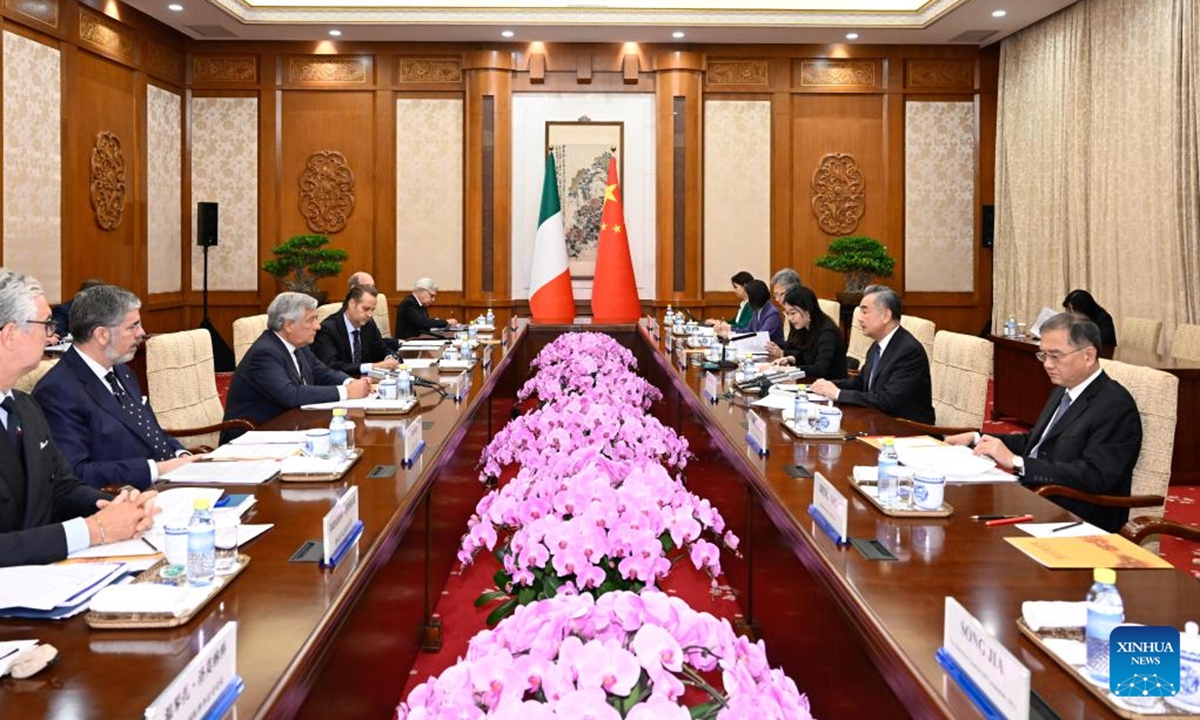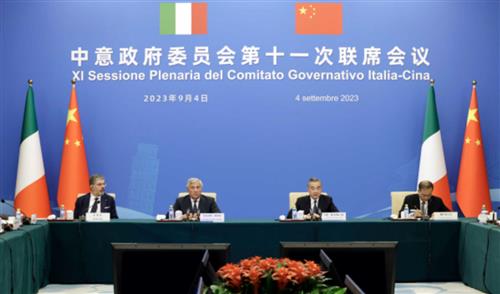FM Wang Yi hails BRI cooperation amid Italy's 'withdrawal' speculation; 'Unwise' for Rome to shut itself out business opportunities when facing economic challenges

Chinese Foreign Minister Wang Yi, also a member of the Political Bureau of the Communist Party of China Central Committee, holds talks with Italian Vice-President of the Council of Ministers and Minister of Foreign Affairs and International Cooperation Antonio Tajani in Beijing, capital of China, Sept. 4, 2023. Photo: Xinhua
Chinese Foreign Minister Wang Yi hailed the fruitful results of China-Italy cooperation under the Belt and Road Initiative (BRI) in various fields, and China's willingness to strengthen practical cooperation and promote the steady development of bilateral relations, during his meeting with the visiting Italian Foreign Minister Antonio Tajani in Beijing on Monday, amid speculation that Italy may withdraw from the BRI.
Chinese experts said on Tuesday that the facts prove that the cooperation between China and Italy under the BRI has been mutually beneficial. The Italian side, whether it is seeking more benefits from cooperating with China or under US diplomatic pressure, should comprehensively and objectively view the role of the BRI in the development of bilateral relations, the experts noted.
With Europe in the shadow of economic recession and geopolitical conflict, it would be wise for the European country to stabilize practical cooperation with China, a large and growing economy. Given the year 2023 marks the BRI's 10th anniversary, if Italy decides to pull out at this point, it means that Rome is shutting itself out of new favorable policies that are expected, experts said.
In meeting with Tajani on Monday, Wang, also a member of the Political Bureau of the Communist Party of China Central Committee, said that in the face of geopolitical and other challenges and disturbances, China and Italy should adhere to the right way of getting along with each other, featuring mutual respect and trust, openness, cooperation and equal dialogue.
China is ready to work with Italy to implement the important consensus reached by the leaders of the two countries, strengthen high-level exchanges, consolidate the political foundation of bilateral relations, expand high-level practical cooperation, enrich people-to-people exchanges and push for sustained, sound and steady development of China-Italy relations, Wang said.
China and Italy are both major global economies, and their cooperation is based on complementary advantages, aiming to achieve mutual benefit and win-win results, said Wang, noting that the two sides' cooperation under the BRI has yielded fruitful results.
Tajani, also the Italian Vice-President of the Council of Ministers, said that Italy attaches great importance to developing long-term and stable relations with China, and will continue to abide by the one-China policy. Italy looks forward to closer high-level exchanges with China and strengthening exchanges and cooperation in various fields.
Although the current international situation is volatile, Italian-China relations will not be affected by it, said Tajani.
Before departing for Beijing, Tajani said on Saturday that the BRI did not bring results that met Italy's expectations, and many parties are against it. However, he noted that Italy wants to work with China, wants to be present in China's market, and is ready for Chinese investment, according to media reports.
"Foreign Minister Wang has reminded everyone of the fruitful results that the BRI win-win cooperation brought to Italy. As a veteran European politician who has long dealt with China, Tajani knows exactly what are the benefits of cooperation with China," Zhao Junjie, a research fellow at the Chinese Academy of Social Sciences' Institute of European Studies, told the Global Times on Tuesday.
In the past five years, bilateral trade volume between China and Italy has increased from $50 billion to nearly $80 billion, with Italy's exports to China growing by about 30 percent, according to Wang Yi.
"Tajani's visit to China may be intended to draw China's attention to Italy's concerns and needs through the BRI in the face of economic problems in Italy to obtain more concessions," Zhao said. "It may also be to appease China and convey to China that Italy is a victim of coercive diplomacy by US, but it does not want to break completely with China."
Wang's remarks show that China hopes Italy, starting from the long-term development of bilateral relations, can have a more comprehensive understanding of the BRI's achievements and its prospects, Cui Hongjian, director of the Department of European Studies at the China Institute of International Studies, told the Global Times on Tuesday.
In times of economic recession and geopolitical conflict in Europe, it is wise for Italy to keep its partners, and China's large and still growing market provides a stable option, Cui said.
Given that Germany and France have recently increased their investment in China, and the British Foreign Secretary has also visited China, Italy should also focus on its own interests and principles, rather than dancing to the tune of US, Cui noted.
Italy has until the end of 2023 to withdraw from its 2019 BRI pact or see it extended for another five years.
This year marks the 10th anniversary of the BRI, and China is likely to take this opportunity to further release favorable policies, Cui said. "If Italy withdraws at this point, it means that Rome will distant itself from the multiple positive effects, which is unwise."
Italian politicians need to be rational and pragmatic about China-Italy BRI cooperation, which will not only bring benefits to both sides, but also promote the deepening of China-European relations, Zhao said.


